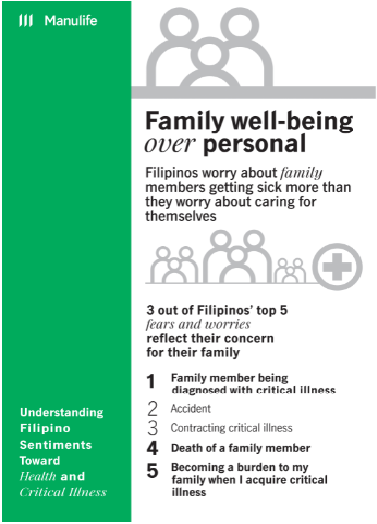Manulife Philippines has published the findings of its health study that aims to understand Filipinos’ perceptions and practices when it comes to their health and protection from critical illness, especially in light of the pandemic.
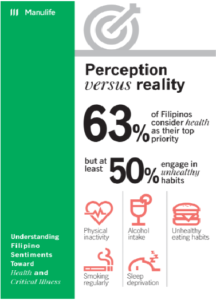
The Manulife Philippines’ study, “Understanding Filipino Sentiments Toward Health and Critical Illness,” revealed that while Filipinos recognize the increased importance of prioritizing their health, they still face barriers in embracing better financial and lifestyle habits. Their desire to be healthy is primarily driven by their concerns for their families’ welfare, especially in the face of the financial burdens of illnesses, more than their own personal welfare.
The study, conducted between January to July 2020, surveyed over 500 Filipinos across the country. It also found that financial worries have a greater impact on Filipinos’ sentiments toward protecting themselves from critical illness, especially during the pandemic.
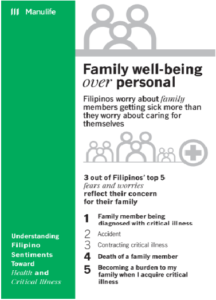
“These evolving times have opened our eyes to the importance of health and wellness, and importantly, made many Filipinos appreciate the value of insurance protection,” said Melissa Henson, Senior Vice President and Chief Marketing Officer of Manulife Philippines. “While Filipinos are universally aware of the importance of staying healthy, we saw that their behaviors are largely influenced by fears and worries, including concern for their family and feeling financially unprepared for illnesses. This study aims to shed light on how they can overcome those worries through financial and health protection.”
The barriers between belief and behavior
Filipinos in general believe that they need to keep themselves healthy to prevent illness. However, the study revealed that their actions do not always align with their health goals, as many still admit to engaging in unhealthy habits.
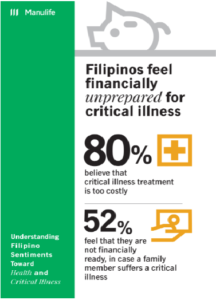
While 63% of the respondents said that they prioritize staying healthy and avoiding illness, 41% are physically inactive, 29% are considered overweight, 10% are obese, and 22% smoke tobacco. Filipinos also ranked 4th in the world on being sleep deprived, clocking an average of 6.5 hours versus the recommended 7 or more hours for adults.
The disconnect between what respondents believe they should be doing and their actual behavior is influenced by barriers that include lack of time, the cost of healthy meals and fitness activities, the influence of their social circles and environment, as well as the need to cope with stress.
Since the COVID-19 pandemic, however, Filipino respondents have recognized the importance of prevention through different heath activities, with three out of the five formed habits they intend to keep in the next 18 months all related to health. These include: finding ways to be more physically healthy (81%), monitoring key health indicators (76%); and keeping track of mental wellness (74%), along with using online services more (75%) for contactless needs in the age of social distancing; and reviewing and managing personal finance more often (78%).
Filipinos prioritize the health and financial security of their families
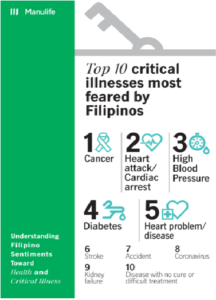
Filipinos identified staying healthy and avoiding illness, having sufficient savings, and assuring their family’s well-being in case something unfortunate happens as their top three priorities in life. In fact, savings for medical emergencies, emergency funds, and healthcare are included in their short-term goals. Alongside healthcare, life insurance protection and retirement are their top long-term goals.
The apparent focus on families remains evident as well in Filipinos’ list of top concerns. Even though 82% of the respondents believe that illnesses can be prevented, 58% still noted that their most profound fear is a loved one being diagnosed with critical illness — this outranks contracting critical illness or getting into an accident themselves. Filipinos also consider being a burden to their family among their top worries. Losing a loved one is also high on their list of fears.
During the pandemic, Filipinos’ top worries around health and safety of their family have heightened, given the fear of acquiring the virus and the number of cases continuing to rise. Health, safety and family make up the top three worries, followed by concerns about work, well-being, savings, investment, home and community, insurance, friends, me-time, and love.
Views on critical illness: Cancer is the most feared
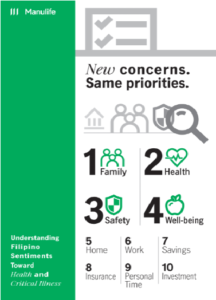
The Manulife Philippines’ study also found that the possibility of critical illness looms large for 75% of Filipinos, who know someone who has been previously diagnosed with one.
Furthermore, Filipinos’ fears are influenced by their perception of the related costs of treatment. While heart disease is the leading cause of death in the Philippines, cancer is the most prominent critical illness in the minds of Filipinos, especially those with higher income, at 57%. Heart attack, hypertension, and diabetes are also on the top list, but they trail behind by a wide margin, all at 6%. Cancer is also the disease they are most afraid of acquiring for either themselves or their loved ones.
This fear is based on the perception that cancer requires the most expensive treatment among all critical illnesses. Filipinos also believe that the cost of treatment is more than they can afford. The majority are either unsure or unconvinced that their medical savings are enough to cover related expenses for themselves and their loved ones.
Gap in financial preparedness when it comes to medical treatment
In an article published in June 2019, Insurance Commissioner Dennis Funa shared that 1.5 million Filipino families are driven into poverty each year, because of unexpected health expenses. In its study, Manulife found that household out-of-pocket payment is the most common way Filipinos finance their health expenditures (54%), while 34% were financed through government schemes and contributory health financing, and 12% were private health plans. Meanwhile, among Filipinos with higher income, owning health insurance plans gives them a sense of security in times of medical emergencies.
Based on this scenario, owning a health insurance product gives more Filipinos the confidence that they can weather through a financial setback when they or their family members fall ill. This should be in addition to engaging in healthy habits to help them prevent contracting illnesses.
Making better decisions in health and finances
Despite these challenges and behaviors, there is an increased appetite for insurance due to fear and concerns as a result of the pandemic. In fact, 60% believe that the local economy will take a longer time to recover, and 48% believe that it will be difficult to get healthcare. These fears and concerns fuel the demand of insurance purchase overall, with 77% planning to buy insurance, mostly life and health-related products, in the next 18 months.
“The uncertainty brought by COVID-19 has created greater awareness and appreciation for insurance products, as it underscored the importance of being prepared for unexpected illness,” added Henson. “This study reinforced the need to continue educating Filipinos on their physical and financial health so they can build better habits, make better financial decisions, and live every day better.”
The Manulife Philippines health study, “Understanding Filipino Sentiments Toward Health and Critical Illness,” was conducted in partnership with ABN Impact InSites Consulting, an independent market research agency.
To access the full report, please visit http://manulife.com.ph/2020HealthStudy

